The Concept of Ideology and Baradat
VerifiedAdded on 2022/08/18
|5
|1035
|13
AI Summary
Contribute Materials
Your contribution can guide someone’s learning journey. Share your
documents today.
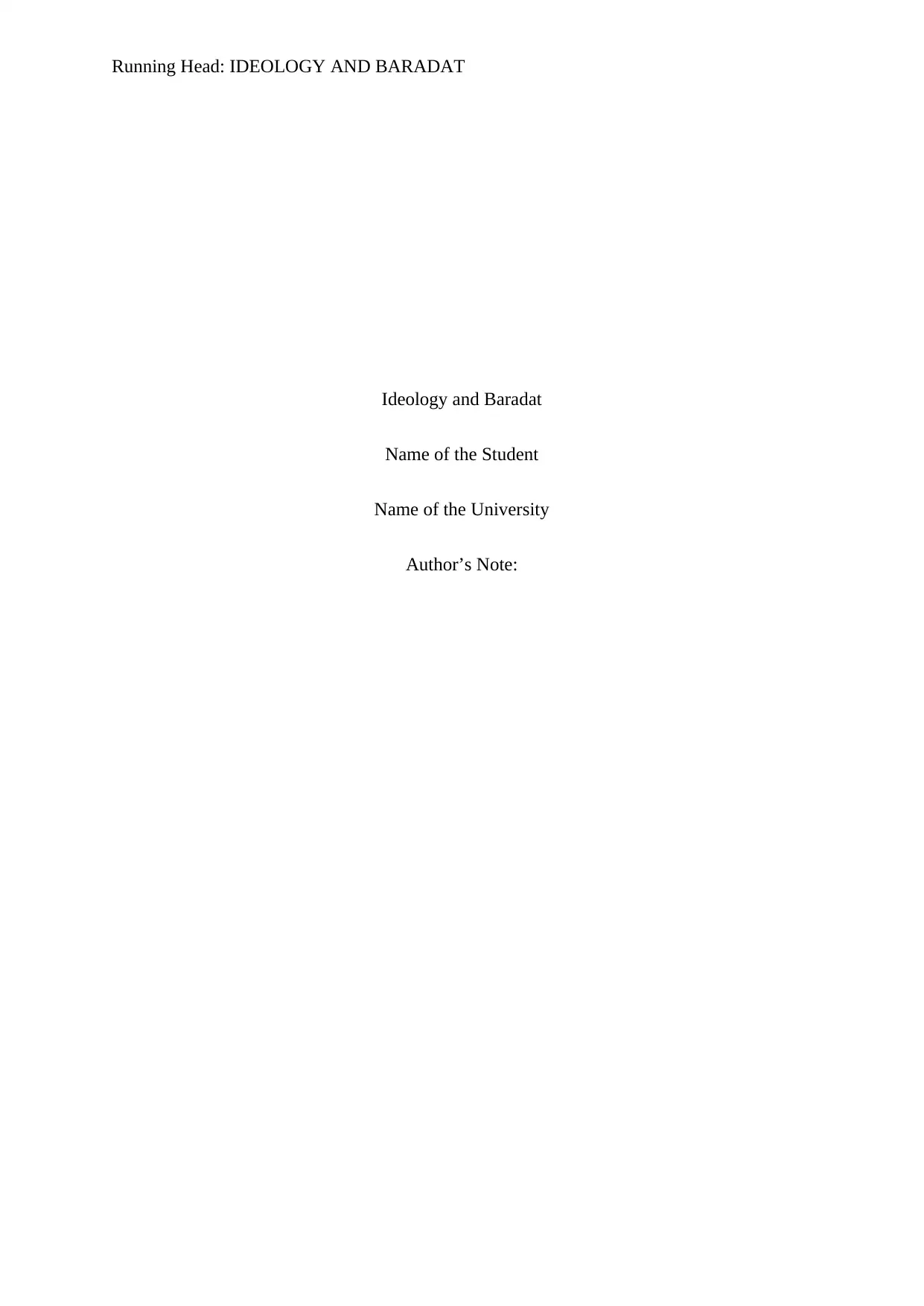
Running Head: IDEOLOGY AND BARADAT
Ideology and Baradat
Name of the Student
Name of the University
Author’s Note:
Ideology and Baradat
Name of the Student
Name of the University
Author’s Note:
Secure Best Marks with AI Grader
Need help grading? Try our AI Grader for instant feedback on your assignments.
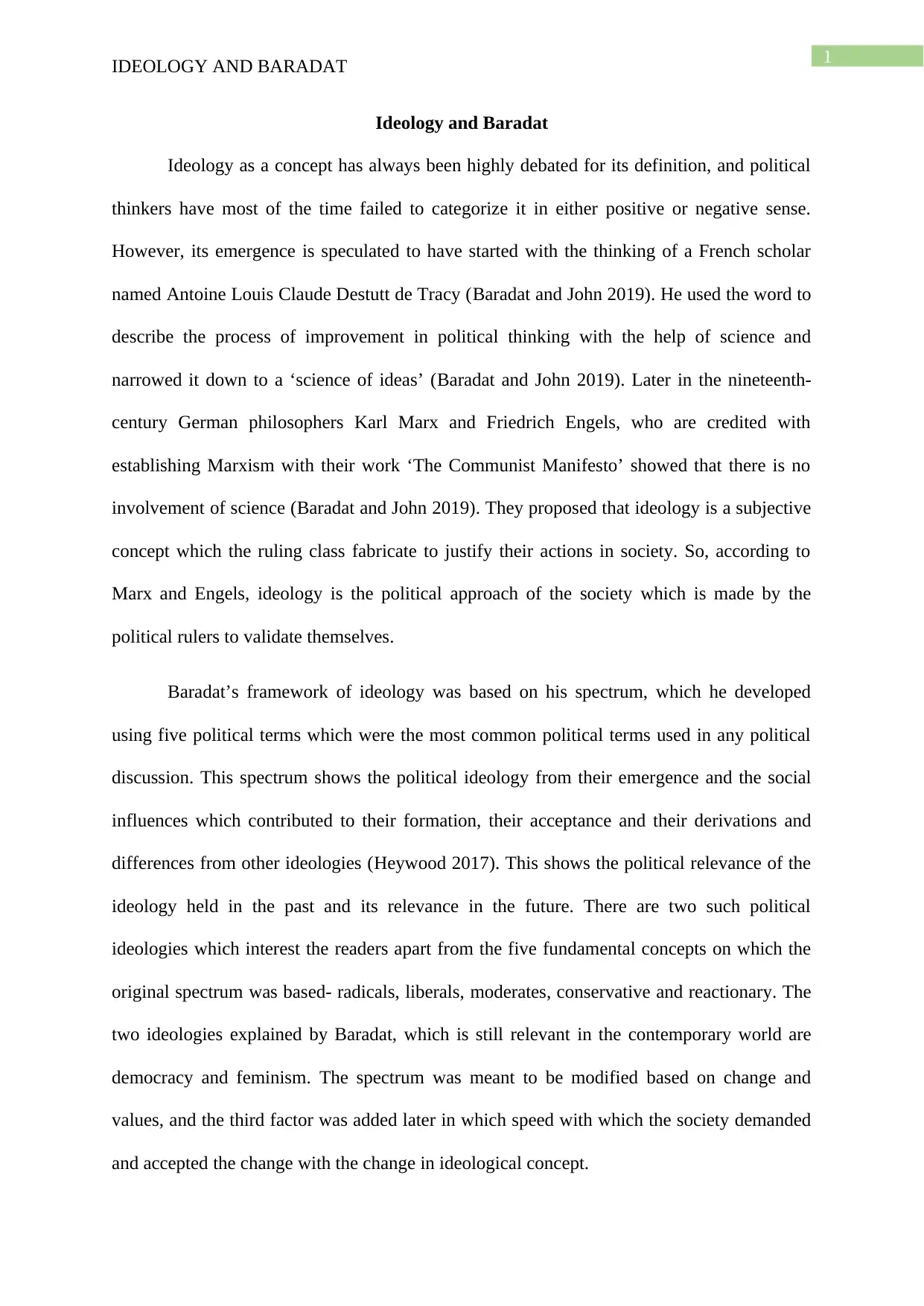
1
IDEOLOGY AND BARADAT
Ideology and Baradat
Ideology as a concept has always been highly debated for its definition, and political
thinkers have most of the time failed to categorize it in either positive or negative sense.
However, its emergence is speculated to have started with the thinking of a French scholar
named Antoine Louis Claude Destutt de Tracy (Baradat and John 2019). He used the word to
describe the process of improvement in political thinking with the help of science and
narrowed it down to a ‘science of ideas’ (Baradat and John 2019). Later in the nineteenth-
century German philosophers Karl Marx and Friedrich Engels, who are credited with
establishing Marxism with their work ‘The Communist Manifesto’ showed that there is no
involvement of science (Baradat and John 2019). They proposed that ideology is a subjective
concept which the ruling class fabricate to justify their actions in society. So, according to
Marx and Engels, ideology is the political approach of the society which is made by the
political rulers to validate themselves.
Baradat’s framework of ideology was based on his spectrum, which he developed
using five political terms which were the most common political terms used in any political
discussion. This spectrum shows the political ideology from their emergence and the social
influences which contributed to their formation, their acceptance and their derivations and
differences from other ideologies (Heywood 2017). This shows the political relevance of the
ideology held in the past and its relevance in the future. There are two such political
ideologies which interest the readers apart from the five fundamental concepts on which the
original spectrum was based- radicals, liberals, moderates, conservative and reactionary. The
two ideologies explained by Baradat, which is still relevant in the contemporary world are
democracy and feminism. The spectrum was meant to be modified based on change and
values, and the third factor was added later in which speed with which the society demanded
and accepted the change with the change in ideological concept.
IDEOLOGY AND BARADAT
Ideology and Baradat
Ideology as a concept has always been highly debated for its definition, and political
thinkers have most of the time failed to categorize it in either positive or negative sense.
However, its emergence is speculated to have started with the thinking of a French scholar
named Antoine Louis Claude Destutt de Tracy (Baradat and John 2019). He used the word to
describe the process of improvement in political thinking with the help of science and
narrowed it down to a ‘science of ideas’ (Baradat and John 2019). Later in the nineteenth-
century German philosophers Karl Marx and Friedrich Engels, who are credited with
establishing Marxism with their work ‘The Communist Manifesto’ showed that there is no
involvement of science (Baradat and John 2019). They proposed that ideology is a subjective
concept which the ruling class fabricate to justify their actions in society. So, according to
Marx and Engels, ideology is the political approach of the society which is made by the
political rulers to validate themselves.
Baradat’s framework of ideology was based on his spectrum, which he developed
using five political terms which were the most common political terms used in any political
discussion. This spectrum shows the political ideology from their emergence and the social
influences which contributed to their formation, their acceptance and their derivations and
differences from other ideologies (Heywood 2017). This shows the political relevance of the
ideology held in the past and its relevance in the future. There are two such political
ideologies which interest the readers apart from the five fundamental concepts on which the
original spectrum was based- radicals, liberals, moderates, conservative and reactionary. The
two ideologies explained by Baradat, which is still relevant in the contemporary world are
democracy and feminism. The spectrum was meant to be modified based on change and
values, and the third factor was added later in which speed with which the society demanded
and accepted the change with the change in ideological concept.
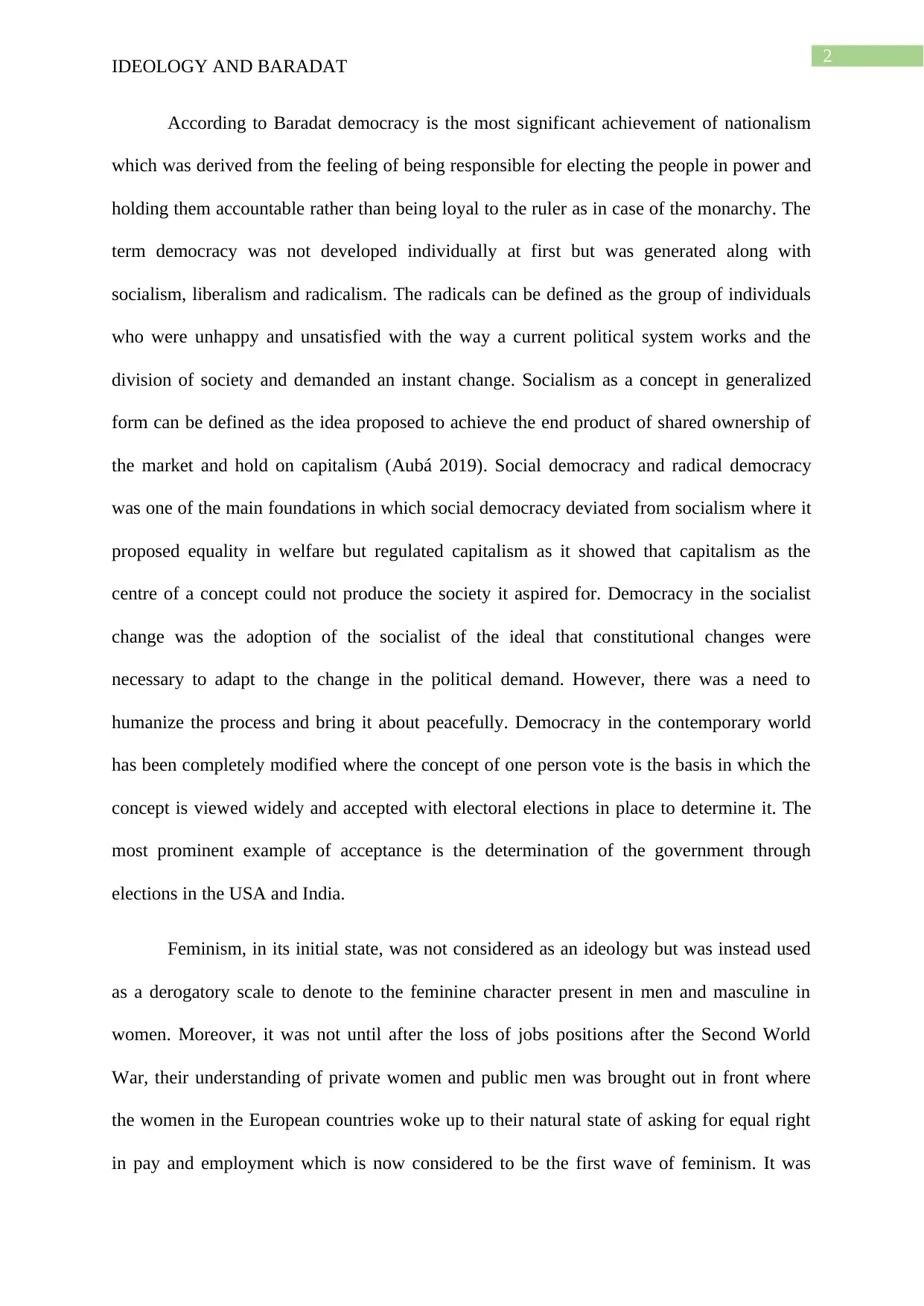
2
IDEOLOGY AND BARADAT
According to Baradat democracy is the most significant achievement of nationalism
which was derived from the feeling of being responsible for electing the people in power and
holding them accountable rather than being loyal to the ruler as in case of the monarchy. The
term democracy was not developed individually at first but was generated along with
socialism, liberalism and radicalism. The radicals can be defined as the group of individuals
who were unhappy and unsatisfied with the way a current political system works and the
division of society and demanded an instant change. Socialism as a concept in generalized
form can be defined as the idea proposed to achieve the end product of shared ownership of
the market and hold on capitalism (Aubá 2019). Social democracy and radical democracy
was one of the main foundations in which social democracy deviated from socialism where it
proposed equality in welfare but regulated capitalism as it showed that capitalism as the
centre of a concept could not produce the society it aspired for. Democracy in the socialist
change was the adoption of the socialist of the ideal that constitutional changes were
necessary to adapt to the change in the political demand. However, there was a need to
humanize the process and bring it about peacefully. Democracy in the contemporary world
has been completely modified where the concept of one person vote is the basis in which the
concept is viewed widely and accepted with electoral elections in place to determine it. The
most prominent example of acceptance is the determination of the government through
elections in the USA and India.
Feminism, in its initial state, was not considered as an ideology but was instead used
as a derogatory scale to denote to the feminine character present in men and masculine in
women. Moreover, it was not until after the loss of jobs positions after the Second World
War, their understanding of private women and public men was brought out in front where
the women in the European countries woke up to their natural state of asking for equal right
in pay and employment which is now considered to be the first wave of feminism. It was
IDEOLOGY AND BARADAT
According to Baradat democracy is the most significant achievement of nationalism
which was derived from the feeling of being responsible for electing the people in power and
holding them accountable rather than being loyal to the ruler as in case of the monarchy. The
term democracy was not developed individually at first but was generated along with
socialism, liberalism and radicalism. The radicals can be defined as the group of individuals
who were unhappy and unsatisfied with the way a current political system works and the
division of society and demanded an instant change. Socialism as a concept in generalized
form can be defined as the idea proposed to achieve the end product of shared ownership of
the market and hold on capitalism (Aubá 2019). Social democracy and radical democracy
was one of the main foundations in which social democracy deviated from socialism where it
proposed equality in welfare but regulated capitalism as it showed that capitalism as the
centre of a concept could not produce the society it aspired for. Democracy in the socialist
change was the adoption of the socialist of the ideal that constitutional changes were
necessary to adapt to the change in the political demand. However, there was a need to
humanize the process and bring it about peacefully. Democracy in the contemporary world
has been completely modified where the concept of one person vote is the basis in which the
concept is viewed widely and accepted with electoral elections in place to determine it. The
most prominent example of acceptance is the determination of the government through
elections in the USA and India.
Feminism, in its initial state, was not considered as an ideology but was instead used
as a derogatory scale to denote to the feminine character present in men and masculine in
women. Moreover, it was not until after the loss of jobs positions after the Second World
War, their understanding of private women and public men was brought out in front where
the women in the European countries woke up to their natural state of asking for equal right
in pay and employment which is now considered to be the first wave of feminism. It was
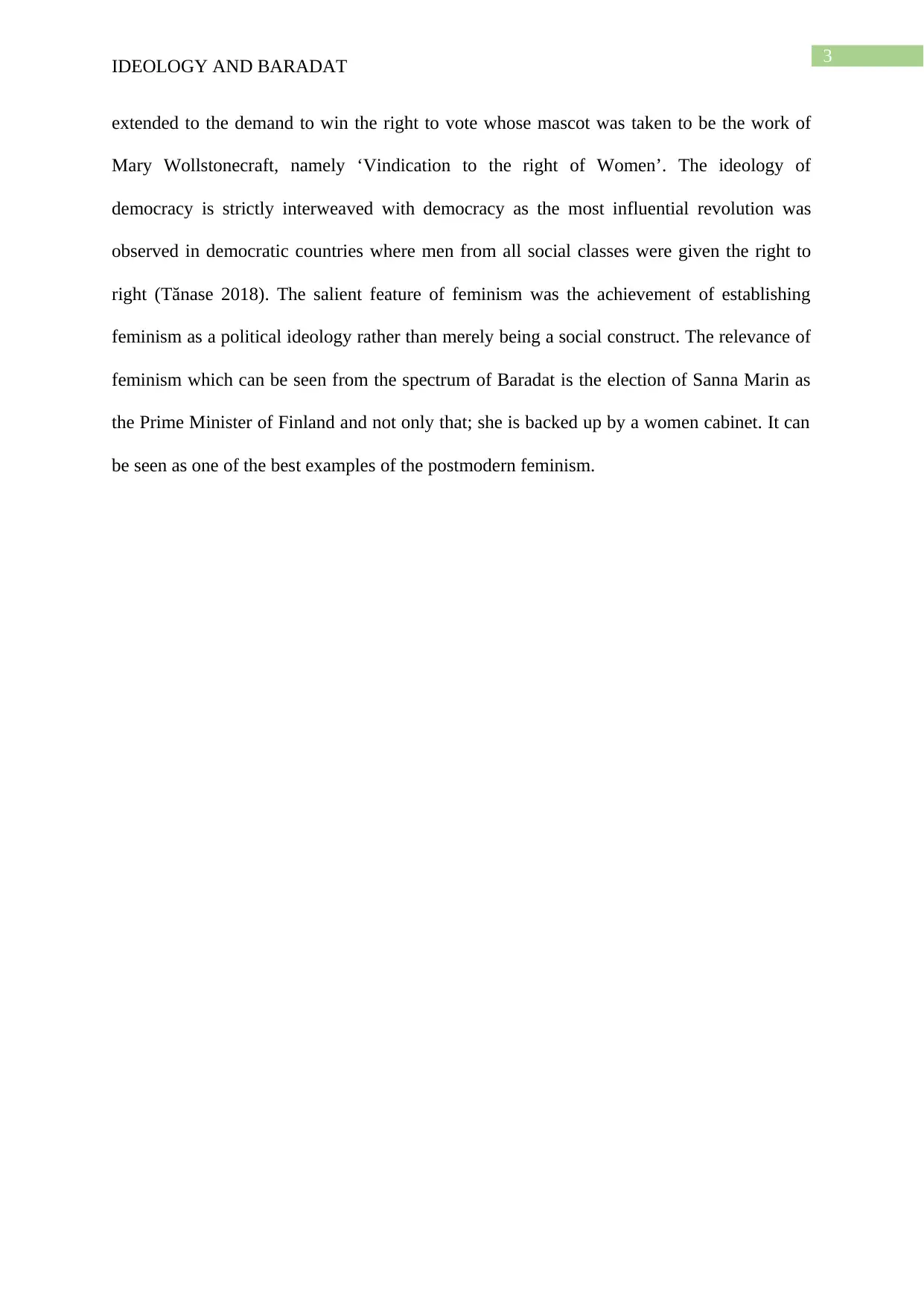
3
IDEOLOGY AND BARADAT
extended to the demand to win the right to vote whose mascot was taken to be the work of
Mary Wollstonecraft, namely ‘Vindication to the right of Women’. The ideology of
democracy is strictly interweaved with democracy as the most influential revolution was
observed in democratic countries where men from all social classes were given the right to
right (Tănase 2018). The salient feature of feminism was the achievement of establishing
feminism as a political ideology rather than merely being a social construct. The relevance of
feminism which can be seen from the spectrum of Baradat is the election of Sanna Marin as
the Prime Minister of Finland and not only that; she is backed up by a women cabinet. It can
be seen as one of the best examples of the postmodern feminism.
IDEOLOGY AND BARADAT
extended to the demand to win the right to vote whose mascot was taken to be the work of
Mary Wollstonecraft, namely ‘Vindication to the right of Women’. The ideology of
democracy is strictly interweaved with democracy as the most influential revolution was
observed in democratic countries where men from all social classes were given the right to
right (Tănase 2018). The salient feature of feminism was the achievement of establishing
feminism as a political ideology rather than merely being a social construct. The relevance of
feminism which can be seen from the spectrum of Baradat is the election of Sanna Marin as
the Prime Minister of Finland and not only that; she is backed up by a women cabinet. It can
be seen as one of the best examples of the postmodern feminism.
Secure Best Marks with AI Grader
Need help grading? Try our AI Grader for instant feedback on your assignments.
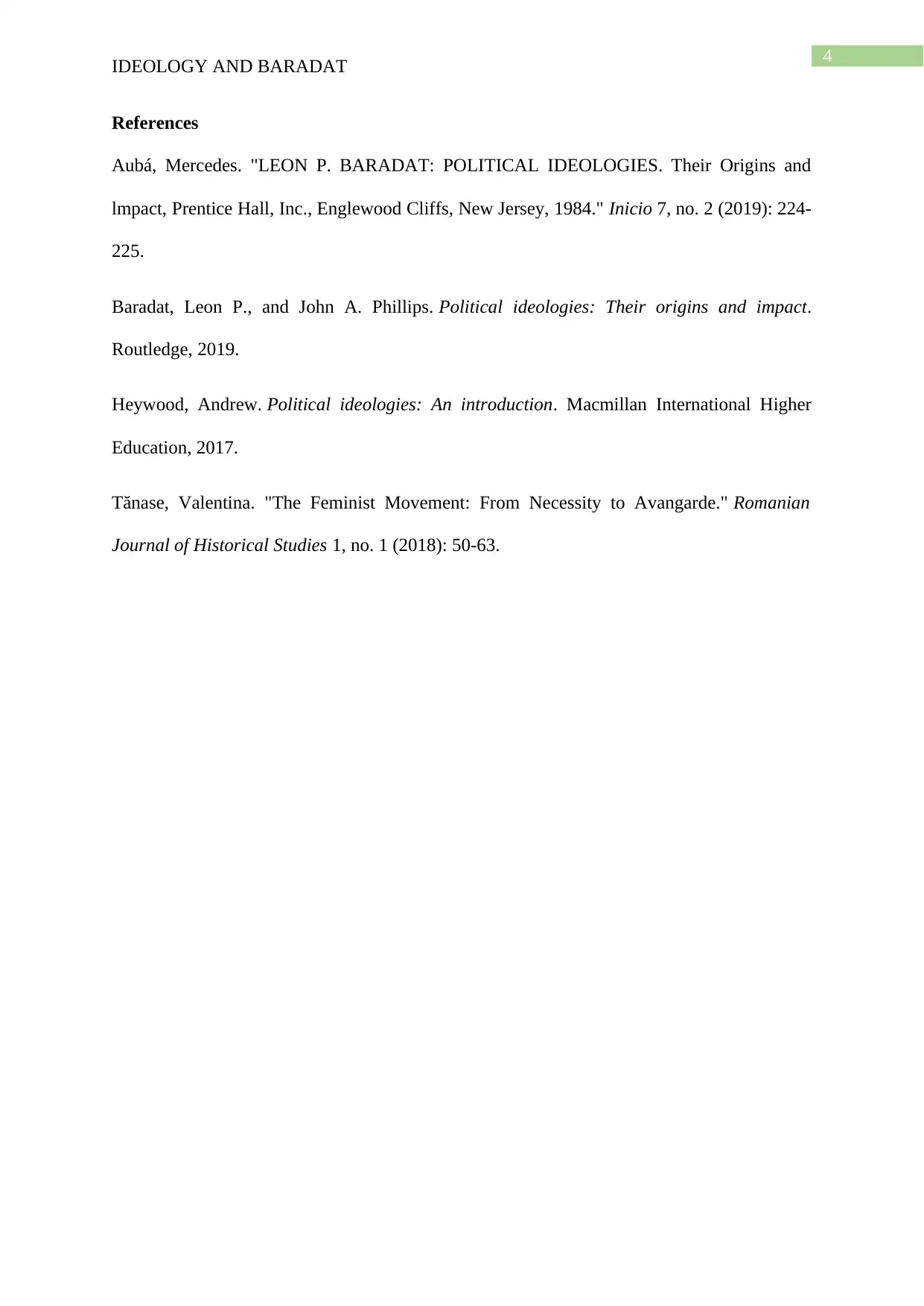
4
IDEOLOGY AND BARADAT
References
Aubá, Mercedes. "LEON P. BARADAT: POLITICAL IDEOLOGIES. Their Origins and
lmpact, Prentice Hall, Inc., Englewood Cliffs, New Jersey, 1984." Inicio 7, no. 2 (2019): 224-
225.
Baradat, Leon P., and John A. Phillips. Political ideologies: Their origins and impact.
Routledge, 2019.
Heywood, Andrew. Political ideologies: An introduction. Macmillan International Higher
Education, 2017.
Tănase, Valentina. "The Feminist Movement: From Necessity to Avangarde." Romanian
Journal of Historical Studies 1, no. 1 (2018): 50-63.
IDEOLOGY AND BARADAT
References
Aubá, Mercedes. "LEON P. BARADAT: POLITICAL IDEOLOGIES. Their Origins and
lmpact, Prentice Hall, Inc., Englewood Cliffs, New Jersey, 1984." Inicio 7, no. 2 (2019): 224-
225.
Baradat, Leon P., and John A. Phillips. Political ideologies: Their origins and impact.
Routledge, 2019.
Heywood, Andrew. Political ideologies: An introduction. Macmillan International Higher
Education, 2017.
Tănase, Valentina. "The Feminist Movement: From Necessity to Avangarde." Romanian
Journal of Historical Studies 1, no. 1 (2018): 50-63.
1 out of 5
Your All-in-One AI-Powered Toolkit for Academic Success.
+13062052269
info@desklib.com
Available 24*7 on WhatsApp / Email
![[object Object]](/_next/static/media/star-bottom.7253800d.svg)
Unlock your academic potential
© 2024 | Zucol Services PVT LTD | All rights reserved.

